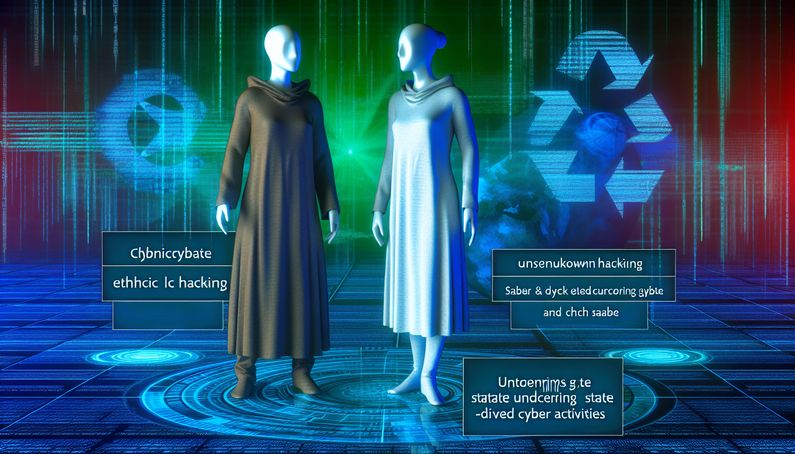
The Ethical Hackers Who Exposed North Korean Cyber Operations
The recent breach of the North Korean Kimsuky hackers by individuals known as ‘Saber’ and ‘cyb0rg’ has sent ripples through the cybersecurity world. This incident, detailed by BleepingComputer, marks a significant shift in cyber warfare dynamics. Ethical hackers, driven by a sense of justice, have exposed the operations of a state-sponsored group, challenging traditional hacking norms. This breach not only questions the security measures of state-backed entities but also highlights the growing trend of ethical hacking, where individuals use their skills to combat unethical practices. The implications are vast, affecting everything from international relations to the financial stability of organizations targeted by such groups.
Implications of the Breach
Ethical Hacking and Its Impact
The breach of the North Korean Kimsuky hackers by ‘Saber’ and ‘cyb0rg’ highlights a shift in cyber warfare. These hackers, motivated by ethical reasons, have taken a stand against what they see as morally wrong practices by Kimsuky, who they argue are driven by financial greed and political agendas (BleepingComputer). This incident underscores the growing trend of ethical hacking, where individuals or groups use their skills to expose unethical practices. This could inspire other hackers to adopt similar stances, potentially leading to internal conflicts within hacking communities and a reevaluation of hacking ethics.
Vulnerability of State-Sponsored Groups
The breach of Kimsuky, a state-sponsored hacking group, raises questions about the security measures employed by such entities. Despite being backed by a nation-state, Kimsuky fell victim to a data breach, suggesting potential vulnerabilities in their operational security. This incident highlights the challenges faced by state-sponsored groups in maintaining the confidentiality of their operations. It also serves as a reminder that no organization, regardless of its backing, is immune to cyber threats. The breach could lead to increased scrutiny of state-sponsored hacking groups and their methods, potentially prompting them to enhance their security protocols to prevent future incidents.
Reputational Damage and Trust Erosion
The exposure of Kimsuky’s data has significant implications for the group’s reputation and the trust placed in them by their sponsors. The breach not only compromises their operational integrity but also exposes the inner workings of their hacking activities. This could lead to a loss of confidence from their sponsors, potentially affecting their funding and support. Moreover, the breach may deter other hackers from collaborating with Kimsuky, fearing similar exposure. The incident serves as a cautionary tale for other hacking groups about the potential reputational damage that can result from a data breach.
Legal and Political Ramifications
The breach of a state-sponsored hacking group like Kimsuky could have far-reaching legal and political consequences. The exposure of their activities may lead to international condemnation and increased diplomatic tensions between North Korea and other nations. Countries targeted by Kimsuky, such as South Korea, Japan, and the United States, may use the leaked information to bolster their cybersecurity defenses and pursue legal actions against the group (CISA). Additionally, the breach could prompt discussions on the need for international regulations and agreements to address state-sponsored cyber activities and protect against similar incidents in the future.
Financial Implications
The breach of Kimsuky also has potential financial implications. The exposure of their data may disrupt their operations, leading to financial losses for the group and their sponsors. The breach could also impact the financial stability of organizations targeted by Kimsuky, as they may need to invest in additional cybersecurity measures to protect against future attacks. Furthermore, the incident may influence the broader cybersecurity market, as companies seek to enhance their defenses against state-sponsored threats, potentially leading to increased demand for cybersecurity solutions and services.
Impact on Cybersecurity Practices
The breach of Kimsuky serves as a wake-up call for organizations worldwide, emphasizing the importance of robust cybersecurity practices. The incident highlights the need for continuous monitoring and assessment of security measures to protect against sophisticated threats. Organizations may need to reevaluate their cybersecurity strategies, focusing on proactive measures such as threat intelligence, vulnerability assessments, and incident response planning. The breach also underscores the importance of collaboration between governments, private sector entities, and cybersecurity experts to share information and develop effective defenses against state-sponsored cyber threats.
Influence on Hacker Communities
The actions of ‘Saber’ and ‘cyb0rg’ in exposing Kimsuky may influence hacker communities, encouraging members to adopt ethical hacking practices. This could lead to a shift in the dynamics of hacker communities, with an increased focus on transparency and accountability. The incident may also inspire other hackers to take a stand against unethical practices within their communities, potentially leading to a more self-regulated environment. However, it could also result in increased tensions and conflicts within hacker communities, as members with differing ethical views clash over the direction and purpose of their activities.
Implications for Targeted Organizations
Organizations targeted by Kimsuky, particularly those in South Korea, Japan, and the United States, may face increased scrutiny and pressure to enhance their cybersecurity measures. The breach of Kimsuky provides these organizations with valuable insights into the group’s tactics and methods, allowing them to strengthen their defenses against future attacks. However, the exposure of their vulnerabilities may also lead to reputational damage and a loss of trust from stakeholders. These organizations may need to invest in additional cybersecurity resources and training to mitigate the risks associated with state-sponsored threats (Infosecurity Magazine).
Broader Implications for International Cybersecurity
The breach of Kimsuky has broader implications for international cybersecurity efforts. It highlights the need for global cooperation and collaboration to address the growing threat of state-sponsored cyber activities. Countries may need to work together to develop international frameworks and agreements to regulate state-sponsored hacking and protect against similar incidents. The incident also underscores the importance of sharing threat intelligence and best practices among nations to enhance global cybersecurity resilience. As the cyber threat landscape continues to evolve, international collaboration will be crucial in addressing the challenges posed by state-sponsored hacking groups like Kimsuky.
Future of State-Sponsored Hacking
The breach of Kimsuky raises questions about the future of state-sponsored hacking. As more state-sponsored groups become targets of ethical hackers, they may need to adapt their strategies and operations to protect against exposure. This could lead to increased investment in cybersecurity measures and a reevaluation of their tactics and objectives. The incident may also prompt state-sponsored groups to adopt more covert and sophisticated methods to avoid detection and maintain their operational security. As the cyber threat landscape continues to evolve, state-sponsored hacking groups will need to remain agile and adaptive to navigate the challenges and risks associated with their activities.
Final Thoughts
The breach of the Kimsuky group serves as a stark reminder of the vulnerabilities inherent in even the most sophisticated state-sponsored hacking operations. As detailed by CISA, the incident underscores the need for robust cybersecurity measures and international cooperation to address the growing threat of state-sponsored cyber activities. The actions of ‘Saber’ and ‘cyb0rg’ may inspire a new wave of ethical hacking, potentially leading to a more transparent and accountable hacking community. However, this also raises questions about the future of state-sponsored hacking and the need for these groups to adapt to an evolving cyber landscape. As organizations worldwide reassess their cybersecurity strategies, the importance of collaboration and information sharing becomes ever more critical in safeguarding against such threats.
References
- BleepingComputer. (2025). North Korean Kimsuky hackers exposed in alleged data breach. https://www.bleepingcomputer.com/news/security/north-korean-kimsuky-hackers-exposed-in-alleged-data-breach/
- CISA. (2025). North Korean Kimsuky hackers exposed in alleged data breach. https://www.cisa.gov/news-events/cybersecurity-advisories/aa20-301a



